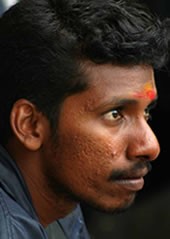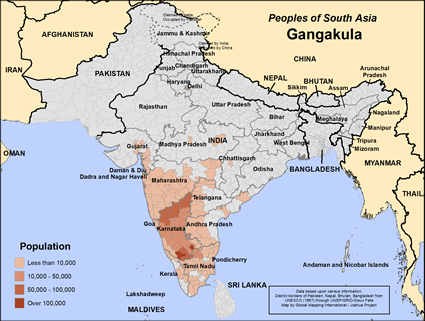Gangakula in India

Photo Source:
Steve Evans - Flickr
Creative Commons
|

Map Source:
People Group data: Omid. Map geography: UNESCO / GMI. Map Design: Joshua Project.
|
| People Name: | Gangakula |
| Country: | India |
| 10/40 Window: | Yes |
| Population: | 1,567,000 |
| World Population: | 1,567,000 |
| Primary Language: | Kannada |
| Primary Religion: | Hinduism |
| Christian Adherents: | 0.00 % |
| Evangelicals: | 0.00 % |
| Scripture: | Complete Bible |
| Ministry Resources: | Yes |
| Jesus Film: | Yes |
| Audio Recordings: | Yes |
| People Cluster: | South Asia Hindu - other |
| Affinity Bloc: | South Asian Peoples |
| Progress Level: |
|
Introduction / History
The Gangakula or Kabbaliga or Koli have been fishermen or boatmen for hundreds of years in south India. "Koli" means boat in Sanskrit. Since fishing and making boats were considered lower occupations in Hindu society, Koli were placed in a lower caste. They also work as village watchmen and as landless farm laborers. Even today many Koli, both men and women, are illiterate. During the British period, Koli became part of small armies who maintained order in south India. Modern education is giving young Gangakula an opportunity to rise above their ancestors' status by becoming doctors, teachers and business owners.
The primary language of the Gangakula is Kannada.
Where Are they Located?
The vast majority of Gangakula live in the south Indian state of Karnataka. Others live in Tamil Nadu, Maharashtra and other areas of south India.
What Are Their Lives Like?
Many Gangakula still work in their traditional job as fishermen, ferrymen and boat builders. They fish the rivers, lakes and ocean of south India. They ferry people across rivers where no bridge is available. They sell their fish in the villages and cities. Some also work on farms owned by others. Women work as domestics to gain more income for their families.
Families arrange marriages. Girls marry in their mid-teens while boys marry in their late teens. Cousin marriages are common. Village Brahman priests perform the weddings. Sons inherit family property with the eldest son getting the home. New couples live near or with the groom's family.
Lack of education has hampered the Gangakula from raising their status. That is slowly changing with young people graduating from college and entering professional careers.
What Are Their Beliefs?
The Gangakula are Hindus. They worship and serve the gods of the Hindu pantheon. They pay special attention to Ganesha, the god of success and good fortune and Durga, the warrior-mother goddess who fights evil spirits. Due to their low status Gangakula are often denied entrance into Hindu temples. They build temporary temples called pantals to Ganesha and Durga.
The Gangakula participate in the major Hindu holidays like Holi, the festival of colors, Diwali, the festival of lights and Navratri, the nine-day celebration in autumn.
What Are Their Needs?
The Gangakula need to hear the good news of Jesus Christ in a way they are understand. They need to see that Hinduism will not save them from their sins. They need help in providing an education for their children.
Prayer Points
Pray that God sends Christian workers and teachers to help the Gangakula escape their spiritual and physical poverty.
Pray the Gangakula see Christ's love in the lives of Indian Christians.
Pray the Lord opens the heart of the Gangakula and many become believers in a growing church in their community.